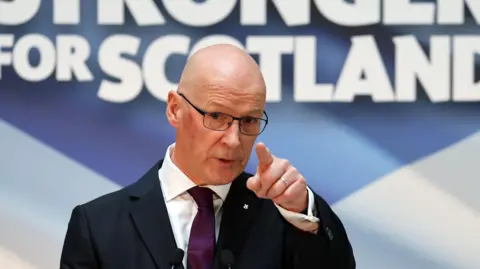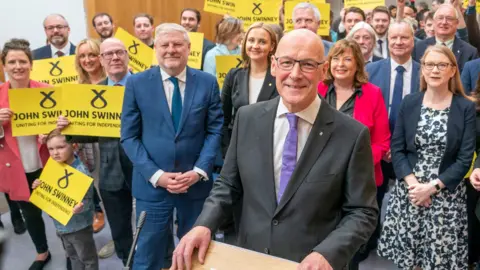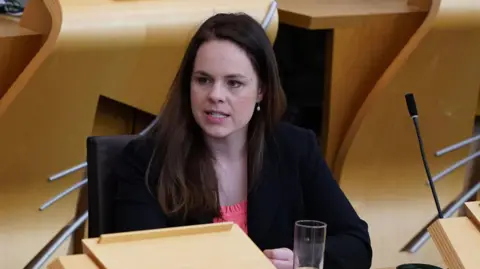John Curtice: Can Swinney bring voters back into the SNP fold?
 Reuters
ReutersJohn Swinney has been sworn in today as Scotland’s first minister, the seventh person to fill that role.
However, he has not only taken on responsibility for leading the country’s devolved government, he has also taken on the job of his party’s leader - with a Westminster election probably no more than six months away.
Governing Scotland is not easy at a time when public services are under pressure and the economy is flatlining.
But turning around the SNP’s fortunes could prove an even more demanding task.
When Humza Yousaf decided to throw the Greens out of the government, polls of voting intention for Westminster were on average putting the SNP on just 33%.
That meant the party was only neck-and-neck with Labour in terms of votes – an outcome that, because of the greater geographical concentration of its vote, would most likely result in Labour winning most seats.
That 33% figure represents no less than a 10-point drop in the party’s rating compared with where it stood when Nicola Sturgeon announced her intention to resign in February last year.
 PA Media
PA MediaThat decision triggered what has proven to be a calamitous year for the SNP.
By March this year only 29% were telling Ipsos that they regarded Mr Yousaf favourably, while 45% looked on him unfavourably.
By last autumn Savanta were reporting that over half felt the party was not united.
And shortly before Mr Yousaf’s fateful decision to oust the Greens, rather more were telling Redfield & Wilton they thought the SNP government was incompetent (37%) than said it was competent (30%).
Even many of those who voted for the SNP in 2019 had their doubts. Almost as many said the party was not united (43%) as said that it was (47%). Less than half (45%) reckon the SNP government is competent.
Meanwhile, the fallout from the departure of the Greens has done nothing to improve the party’s standing.
Two polls conducted since then, but before it became clear Mr Swinney would become leader without a contest, put the SNP behind Labour.
Equally, YouGov were now reporting that 67% believed that Mr Yousaf was doing badly as first minister, up from 45% last September. As many as 60% now regarded him unfavourably.
But in bringing down Mr Yousaf the opposition parties have potentially given the SNP an opportunity to repair some of the damage of the last 12 months.
Certainly, Mr Swinney starts his job with rather better polling numbers than his predecessor.
Only 40% feel unfavourably about him, 20 points lower than the equivalent figure for Mr Yousaf.
According to Ipsos 37% feel Mr Swinney will do a good job as first minister, only 23% a bad one.
And Panelbase say that among those who voted SNP in 2019, 28% reckon they are more likely to vote SNP with Mr Swinney at the helm - over twice the proportion (13%) who take the opposite view.
 PA Media
PA MediaHowever, whether Mr Swinney can seize the opportunity he seems to have remains to be seen.
He would appear to have a good chance of being able to make his party seem less divided. The lack of a contest for the leadership will help for a start. And Mr Swinney is widely respected within his party.
Meanwhile, much of the open criticism of Mr Yousaf’s regime came from those associated with Kate Forbes, who was narrowly defeated by Mr Yousaf in last year’s ballot.
She is now part of Mr Swinney’s new government. So perhaps the noises off will die down.
 PA Media
PA MediaAnd there is also an easily identifiable body of voters for Mr Swinney to target – those who have become disenchanted with the SNP but who still believe in independence.
Panelbase have reported that only just over half (56%) of those who would vote Yes in an independence referendum are currently minded to vote SNP for Westminster. As many as 21% say they would vote Labour.
But the key question is whether Mr Swinney can find the persuasive arguments and engaging style needed to bring these voters back into the SNP fold.
This was the aspect of the job of party leader that Mr Swinney found more difficult when he was previously leader 20 years ago.
Mr Swinney says he is a changed man. The SNP have to hope this means he can now change their fortunes.
Sir John Curtice is professor of politics at the University of Strathclyde and senior research fellow at the Scottish Centre for Social Research and ‘The UK in a Changing Europe’. He is also co-host of the Trendy podcast.
